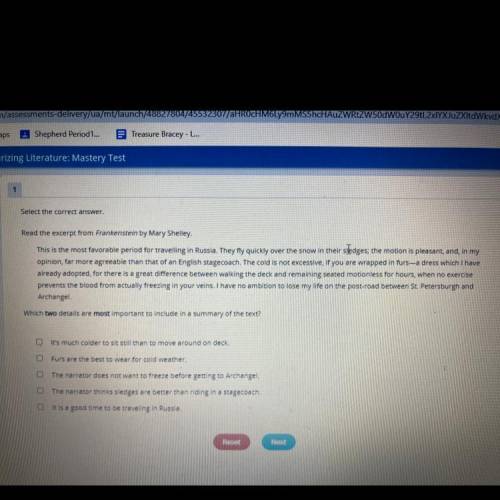Select the correct answer
Reed the excerpt from Prankenstein by Mary Shelley
This is the most...

English, 02.12.2020 07:00 CarlyAnnn9949
Select the correct answer
Reed the excerpt from Prankenstein by Mary Shelley
This is the most favorable period for travelling in Russia. They y quickly over the snow in their sieges the mocion is pleasant and in my
opinion far more agreeable than that of an English stagecoach. The cold not excessive. If you are wragged in fursa dress which I have
already adopted for there is a great difference between walking the deck and remaining sescedimeconiess for hours when no exercise
prevents the blood from actually freezing in your veins. I have no amontoaseyeon me 205 recens Pecersburgh and
Archange
which to detais are most important to include in a summary of the text
its much colder to sit still than to move around on deck
Purs are the best to wear for cold weather
The narrator does not want to freeze before getting to remerge
The narestor this sledges are better than roing in a stagecoach
Dis a good me to be trave ng RUSS


Answers: 3


Another question on English

English, 22.06.2019 01:00
Compare: what are the similarities and differences between "artificial flavors" and "natural flavors"? why does schlosser explain these two terms in such detail?
Answers: 1

English, 22.06.2019 01:00
Read the excerpt from act 1 of a doll's house. helmer: nora! [goes up to her and takes her playfully by the ear.] the same little featherhead! suppose, now, that i borrowed fifty pounds today, and you spent it all in the christmas week, and then on new year's eve a slate fell on my head and killed me, and— nora: [putting her hands over his mouth]. oh! don't say such horrid things. helmer: still, suppose that happened, —what then? nora: if that were to happen, i don't suppose i should care whether i owed money or not. helmer: yes, but what about the people who had lent it? nora: they? who would bother about them? i should not know who they were. helmer: that is like a woman! but seriously, nora, you know what i think about that. no debt, no borrowing. there can be no freedom or beauty about a home life that depends on borrowing and debt. we two have kept bravely on the straight road so far, and we will go on the same way for the short time longer that there need be any struggle. nora: [moving towards the stove]. as you , torvald. how does the interaction between helmer and nora advance the plot? nora realizes that helmer will completely disapprove of her having borrowed money, so she has to continue to keep it a secret from him. nora realizes that she and helmer have the same ideas about financial issues, and the conversation brings them closer together later in the play. helmer realizes that nora is more responsible with money than he originally thought, and he trusts her more with finances later in the play. nora realizes that helmer knows a lot more about borrowing and lending, and she will seek his input later when she needs it.
Answers: 1

English, 22.06.2019 02:20
Read the excerpt from "politics and the english language" by george orwell. by this morning’s post i have received a pamphlet dealing with conditions in germany. the author tells me that he "felt impelled” to write it. i open it at random, and here is almost the first sentence that i see: "[the allies] have an opportunity not only of achieving a radical transformation of germany’s social and political structure in such a way as to avoid a nationalistic reaction in germany itself, but at the same time of laying the foundations of a cooperative and unified europe.” which statement is correct? orwell uses an example and statistical evidence in this excerpt. orwell uses an example and a quotation for evidence in this excerpt. orwell uses hypothetical and factual evidence in this excerpt. orwell uses hypothetical and statistical evidence in this excerpt.
Answers: 2

English, 22.06.2019 02:30
Select the correct answer. which groups fought in the trojan war? a. mycenaeans and minoans b. greeks and trojans c. minoans and greeks d. minoans, mycenaeans, and trojans
Answers: 1
You know the right answer?
Questions


Mathematics, 15.05.2021 17:40

Mathematics, 15.05.2021 17:40

Mathematics, 15.05.2021 17:40

English, 15.05.2021 17:40

Mathematics, 15.05.2021 17:40

Biology, 15.05.2021 17:40


Mathematics, 15.05.2021 17:40

Arts, 15.05.2021 17:40

Mathematics, 15.05.2021 17:40

English, 15.05.2021 17:40







Mathematics, 15.05.2021 17:50





